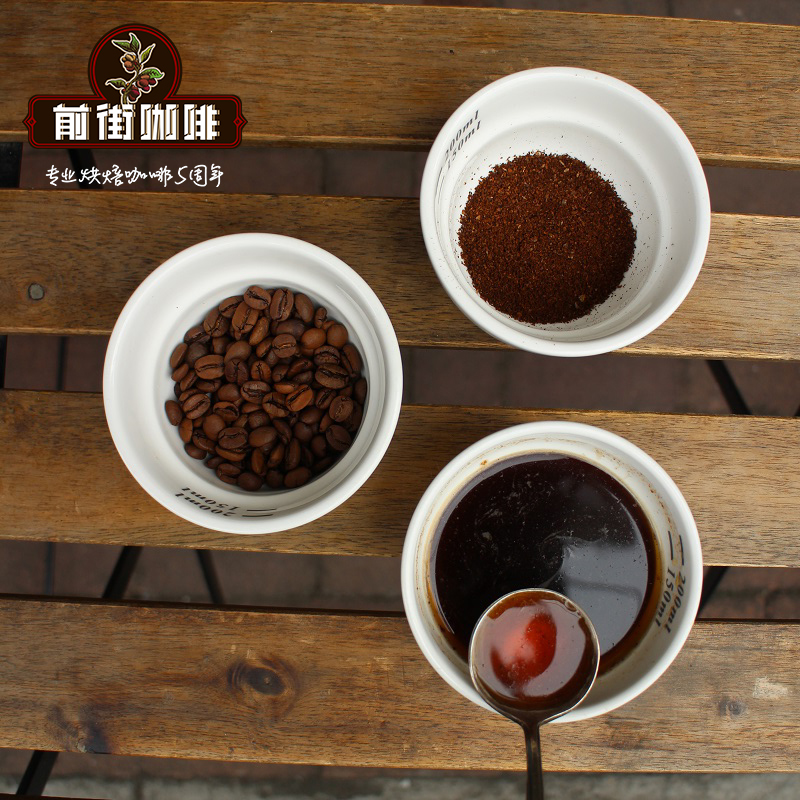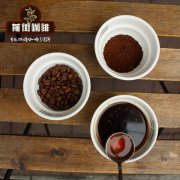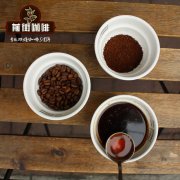What's the taste and taste of East Timor Alpine G1 coffee beans? How to make Timmy Coffee in East Timor

Professional coffee knowledge exchange more coffee bean information please follow the coffee workshop (Wechat official account cafe_style)
What's the taste and taste of East Timor Alpine G1 coffee beans? How about the planting history of East Timor Tim Coffee varieties?
East Timor Maubbessee coffee, rubber, rosewood metaphor is known as the "three treasures of Timor". In particular, it can be seen that coffee accounts for the highest proportion of economic importance in Timor, located in East Timor, a small island between Indonesia and Australia. Independence was decided in a referendum at the end of August 1999, with the support of Australia and other countries, and formally became independent at 00:00 on 20 May 2002. coffee, known as the first of the "three treasures of Timor", is the first important cash crop in the country.
The Democratic Republic of East Timor, commonly known as East Timor, is a country located at the eastern end of Timor Island in Southeast Asia. It was once Portugal's only two overseas colonies in the far East. At the end of August 1999, with the support of Australia and other countries, it decided to become independent by referendum. It became independent at 00:00 on May 20, 2002, and formally joined the United Nations on September 27, 2002, becoming the 191st member of the United Nations. The people's Republic of China is the first country to establish diplomatic relations with it.
The capital Dili, the popular currency is the US dollar, has a population of about 1.269 million (statistics in 2016), and the official languages are Portuguese and Dayton. East Timor (East Timor), a former Portuguese colony, is located on a small island between Indonesia and Australia. In 1999, the World Association of Coffee producing countries (ACPC) announced that East Timor is the world's largest producer of organic coffee. East Timor's coffee, rubber and rosewood are known as the "three treasures of Timor", thus it can be seen that coffee accounts for the highest proportion of economic importance in Timor. In the past, people were very strange to East Timor coffee. Until a Nobel Prize banquet held in Norway in 2001, the organizers adopted the proposal to provide guests with East Timor Arabica coffee, thus expanding its popularity. The territory is mountainous, dense forests, coastal plains and valleys, mountains and hills account for 3/4 of the total area, the highest peak of Mount Tata Mailao Ramalao peak 3495 meters above sea level, plains, valleys belong to the savanna climate, other areas for the tropical rain forest climate, the annual average temperature of 26 ℃. The rainy season is from December to March of the following year, and the dry season is from April to November. It is located in the tropics. The natural conditions are quite suitable for the cultivation of coffee. In the past, organic cultivation techniques were adopted, and the same is true now. The soil environment of Timor is not man-made damage caused by modern agriculture, so it has a unique natural environment; East Timor alpine wild coffee is characterized by high altitude, wild, pesticide-free, internationally famous and high-quality reputation. Most of the coffee in East Timor is grown in small farms in an organic way, with a small quantity but good quality, high purity and spice flavor, suitable for a variety of different degrees of baking, and comparable to high-quality Java varieties in appearance and taste.
The original Arabica coffee beans produced in Indonesia and East Timor have larger granules, moderate aroma and bitterness, and light acidity. The palate is full-bodied like Colombia, full-bodied, with delicate lipids, adding slippery tenderness to the entrance, good cleanliness, Kona-like sweetness and nutty aromas, full-bodied, full-bodied and strong aftertaste of caramel chocolate in the mouth, carambola and plum sweet and sour fruit flavors in the low-key fruit acidity. The beans purchased in this batch are Maubesse beans and 100% pure Arabica organic beans. This batch of beans still has a typical Timorese taste in thickness and rhyme. The whole section washing method is adopted to treat the beans. After the cup test, her acid texture is retained by the water washing method, and it can only be exported after several manual screening before export. The bean shape is perfect, the quality and price is good.
Mount Tatamailau, the highest peak in East Timor, at 2963 meters above sea level, is also the highest peak in all former Portuguese colonial regions. East Timor coffee beans are collected from wild coffee trees planted more than 1800 meters above sea level around Tatamailau Mountain. In 1999, the World Association of Coffee producing countries (ACPC) announced that East Timor is the largest producer of organic coffee in the world. After the independence of East Timor in 2002, the Government vigorously promoted the cultivation of organic coffee and announced in the form of a decree that chemicals such as chemical fertilizers and pesticides were not allowed to be used. East Timor alpine coffee bean species belong to Arabica, which is cultivated organically, insists on natural food without chemical fertilizers and herbicides, and absorbs nutrients contained in nature itself. the coffee grown is pollution-free, high-quality coffee. This kind of coffee beans, sweet and bitter in the middle, with lemon and citrus acid, mild acidity, a little nut chocolate sweet taste, mellow aroma, rich sweetness after rhyme.
Origin: East Timor
Altitude: 1800 m
Grade: Grade 1
Raw bean treatment: Raw Washed washing
Flavor: clean and mellow taste, rich fruit aromas, delicate lipids, sweet and persistent caramel chocolate finish.
In the past, most people were very strange to East Timorese coffee, until a Nobel Prize banquet held in Norway in 2001, the organizers adopted the proposal to serve East Timorese coffee to guests, thus expanding its popularity.
Flavor: no acid, sweet and bitter taste in the middle, beans are large, the size is uncertain and the color of raw and ripe beans is quite different, not sour, not bitter, not astringent, mellow, full-bodied and full-bodied, after drinking, the sweetness of caramel and cocoa is persistent, it is suitable for different degrees of baking, seasoning and drinking, the taste changes one after another, making people aftertaste again and again.
Qianjie cuisine is recommended:
Filter cup: KONO filter cup
Water temperature: 88 degrees
Degree of grinding: small Fuji degree of grinding 4
Cooking method: the ratio of water to flour is 1:14, 17g powder, 25g water for the first time, steaming for 30s, and 238g water for the second time. The extraction time is about 2:30 seconds.
Analysis: there are not many ribs at the bottom of the Kono cup, and the filter paper clings to the filter cup to achieve the purpose of limiting air flow, which can make water and coffee powder have longer contact soaking time in the filter cup and ensure the extraction time and extraction rate of rough grinding. In this way, the coffee powder can be fully extracted, enhance the mellow taste and make the taste more concentrated.
Important Notice :
前街咖啡 FrontStreet Coffee has moved to new addredd:
FrontStreet Coffee Address: 315,Donghua East Road,GuangZhou
Tel:020 38364473
- Prev

How is the development of coffee bean economy in East Timor? What is the flavor and taste of East Timor Timo Coffee?
Professional coffee knowledge exchange more coffee bean information please follow the coffee workshop (Wechat official account cafe_style) how is the development of coffee bean economy in East Timor? What is the flavor and taste of East Timor Timo Coffee? This is East Timor Tatamailau. You will find that it is in the form of whole beans, and you may find that it brews the black coffee of the day. The name of this kind of coffee comes from the east
- Next

Coffee flavor and taste of washed organic beans in Maubesse, East Timor? East Timor coffee species
Professional coffee knowledge exchange more coffee bean information please follow the coffee workshop (Wechat official account cafe_style) East Timor Maubesse production area of washed organic beans coffee flavor and taste? What kinds of coffee do you have in East Timor? East Timor, located between Indonesia and Australia, was formerly a colony of Portugal; Indonesia invaded after Portugal left in the early 1970s
Related
- Detailed explanation of Jadeite planting Land in Panamanian Jadeite Manor introduction to the grading system of Jadeite competitive bidding, Red bid, Green bid and Rose Summer
- Story of Coffee planting in Brenka region of Costa Rica Stonehenge Manor anaerobic heavy honey treatment of flavor mouth
- What's on the barrel of Blue Mountain Coffee beans?
- Can American coffee also pull flowers? How to use hot American style to pull out a good-looking pattern?
- Can you make a cold extract with coffee beans? What is the right proportion for cold-extracted coffee formula?
- Indonesian PWN Gold Mandrine Coffee Origin Features Flavor How to Chong? Mandolin coffee is American.
- A brief introduction to the flavor characteristics of Brazilian yellow bourbon coffee beans
- What is the effect of different water quality on the flavor of cold-extracted coffee? What kind of water is best for brewing coffee?
- Why do you think of Rose Summer whenever you mention Panamanian coffee?
- Introduction to the characteristics of authentic blue mountain coffee bean producing areas? What is the CIB Coffee Authority in Jamaica?

